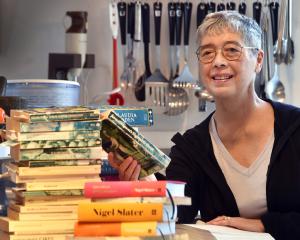Healthy eating resolutions are best approached with small bites.
After all that Christmas eating and New Year partying, chances are you've made a resolution to lose weight, eat more healthily and get more exercise.
The problem is we want results to be quick and lasting but that's not how diets work, as those of us who have made similar resolutions in the past know only too well.
''We want an instant fix, but nutrition's not like that,'' says honorary Associate Prof Winsome Parnell, of the human nutrition department at the University of Otago.
''It's gradual. That's why we learn the habits gradually when we are growing up and if you want to unlearn some, if they are to be sustainable, then you have to do it gradually.''
If you want to reduce salt or sugar in your diet, or eat more vegetables or whole grains, do it gradually, bit by bit, until you adapt to the new tastes. Getting extreme and banning it will just rebound, she says.
Unfortunately, good nutrition advice tends to be boring. We all know the drill: eat a variety across all the food groups; vegetables and fruits (at least three serves of vegetables and two of fruit, but more is better); cereals, especially whole grains; and meat or meat substitutes.
But, being human, we want not only instant results but also novelty, and we sometimes change our diets dramatically. This is particularly common in response to a health scare, Prof Parnell says.
''I see this a lot. People are prepared to make quite drastic changes in response to a health incident and they take on the behaviours that would have reduced their risk in getting it, but probably at that time can't undo what's happened.
''If you think about it, some things take a long time: you don't just suddenly get high cholesterol or become overweight. It has built up over a long time, so what you've been doing many years before is often the issue.''
People say they feel better after making an extreme dietary change, such as eliminating dairy or wheat or grains or other food groups, but often it is because it makes them feel there's something they can do when other things are out of control, she said.
''People often do that in response to cancer diagnoses. When I had breast cancer myself 20 years ago, people said 'well you'll be trying this and trying that, going dairy-free', but I didn't take any dietary measures at all.
''I wasn't convinced that any of those extreme measures would prolong my life. But then it would be fair to say that I'd probably adopted a reasonable balance before. I would be ashamed of myself if I hadn't,'' she said.
While some dietary restrictions are essential for those with health issues such as coeliac disease or allergies, there are a number of currently trendy and often drastic diets, a lot of them self-prescribed following advice from bloggers and authorities whose training, if any, may be dubious.
Everybody considers themselves an expert in nutrition these days, says Prof Parnell, and she sometimes wishes she had chosen another profession.
''Socially, I never raise the subject of my areas of expertise because you end up in an argument or I'll end up being very tense and uncomfortable because I want to tell them they are thinking a lot of rubbish, and you can't do that over a dinner table. People have visited an untrained person or got something off the web or read it in the Women's Weekly and they know and that's it.''
It has got to the stage that if you are entertaining you have to ask people if they have any dietary restrictions or you'll be caught out by someone who doesn't eat something, she says.
''That's fine if it makes people more conscious of what they eat and more aware, then I approve of all that, but you can wear out doing that.''
People forget that when you remove a food group, such as grains or dairy, from your diet, you are also removing a lot of other essential vitamins and minerals, she warns.
Sugar is currently public health enemy No1 and several countries, such as the United Kingdom and Mexico, are imposing a tax on sugary drinks.
''I have looked at which foods contribute the sugar in our diets. We have focused on sugary drinks and hammered the soft-drink industry but when did anyone talk about sweet manufacturers or the sweet-eating habits of New Zealand kids? They are not the best.''
Since 1989 Prof Parnell has worked on the 10-yearly national nutrition surveys and one on children's nutrition, but the last children's one was in 2002 and the last adult one in 2008-09 and it appears the Ministry of Health has no funds for conducting more, she said.
Not only does the nutrition community want to know what we are eating and how the foods and nutrients change, but people who legislate on food need know what the population is eating now.
''If you want to put a new additive in food, supposing we want to put iodine in bread to make sure we have enough, then from the nutrition survey data you see what people are eating and you model it. You say if we put this much in, men and women and high-eating teenagers will get so much. Then you can try different levels and do a theoretical calculation, and that is very important before you set legislation in place that says we now require bakers to put such and such in bread,'' she said.
However, if there is no current New Zealand data, regulators have to use data from elsewhere, such as Australia, where people eat differently.
''What for many years has fascinated me is that a lot of the paranoia about sugar has come out of the US, and they have a much sweeter diet than we do. All of their dietary surveys show their sucrose intake is much higher than ours, and their fructose intake as well.
''For example, peanut butter in the US is sweetened; ordinary bread there tastes very sweet to me; families I visited all served sweet drinks with meals, whereas we would serve water. When I look at US research the base levels of sweetness are always higher than in New Zealand, so people will read a US research article which is panic panic and assume we are the same, and we are not.''













